Business Ethics: Analysis of Corruption in the Australian Context
VerifiedAdded on 2021/06/17
|8
|1863
|28
Essay
AI Summary
This essay provides a comprehensive analysis of business ethics and corruption in Australia. It begins by defining corruption and its various forms, highlighting its impact on both public and private sectors. The essay then examines the prevalence of corruption in Australia, comparing it to other nations and exploring the perception of corruption within the country. It delves into the specific areas where corruption is more likely to occur, such as the political and mining sectors. The essay discusses relevant anti-corruption legislation at the federal, state, and regional levels, including the Criminal Code, Anti-Money Laundering and Counter-Terrorism Financing Act, and the Corporations Act. It also outlines the penalties for corrupt activities and the role of international instruments like the UN Convention against Corruption. Furthermore, the essay analyzes the strategies adopted by the Australian government to combat corruption, including constitutional safeguards, transparency, accountability, and international cooperation. The essay concludes by acknowledging that, while Australia has implemented various measures to address corruption, it remains an ongoing challenge, emphasizing the need for continuous efforts and international collaboration to deter corruption effectively.
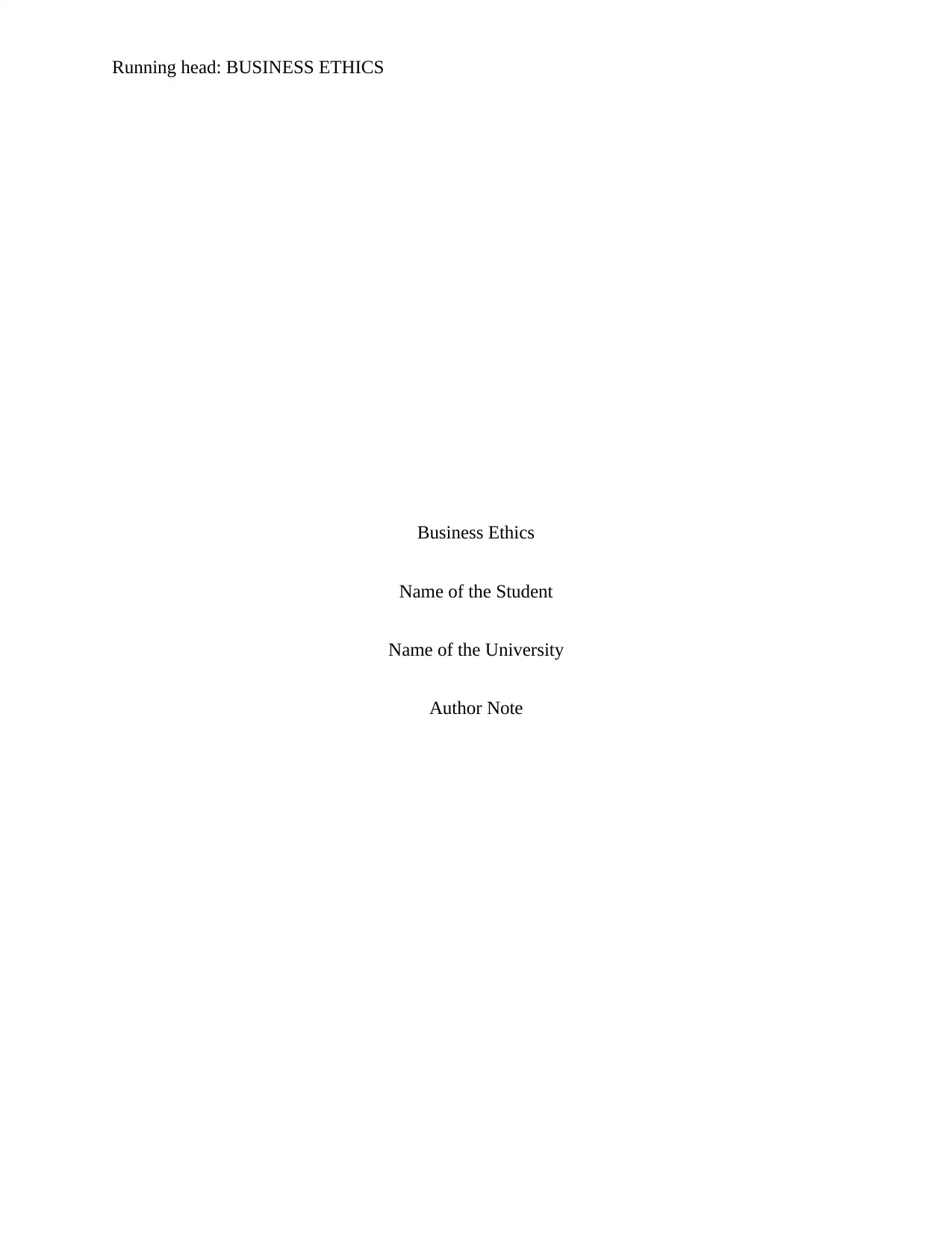
Running head: BUSINESS ETHICS
Business Ethics
Name of the Student
Name of the University
Author Note
Business Ethics
Name of the Student
Name of the University
Author Note
Paraphrase This Document
Need a fresh take? Get an instant paraphrase of this document with our AI Paraphraser
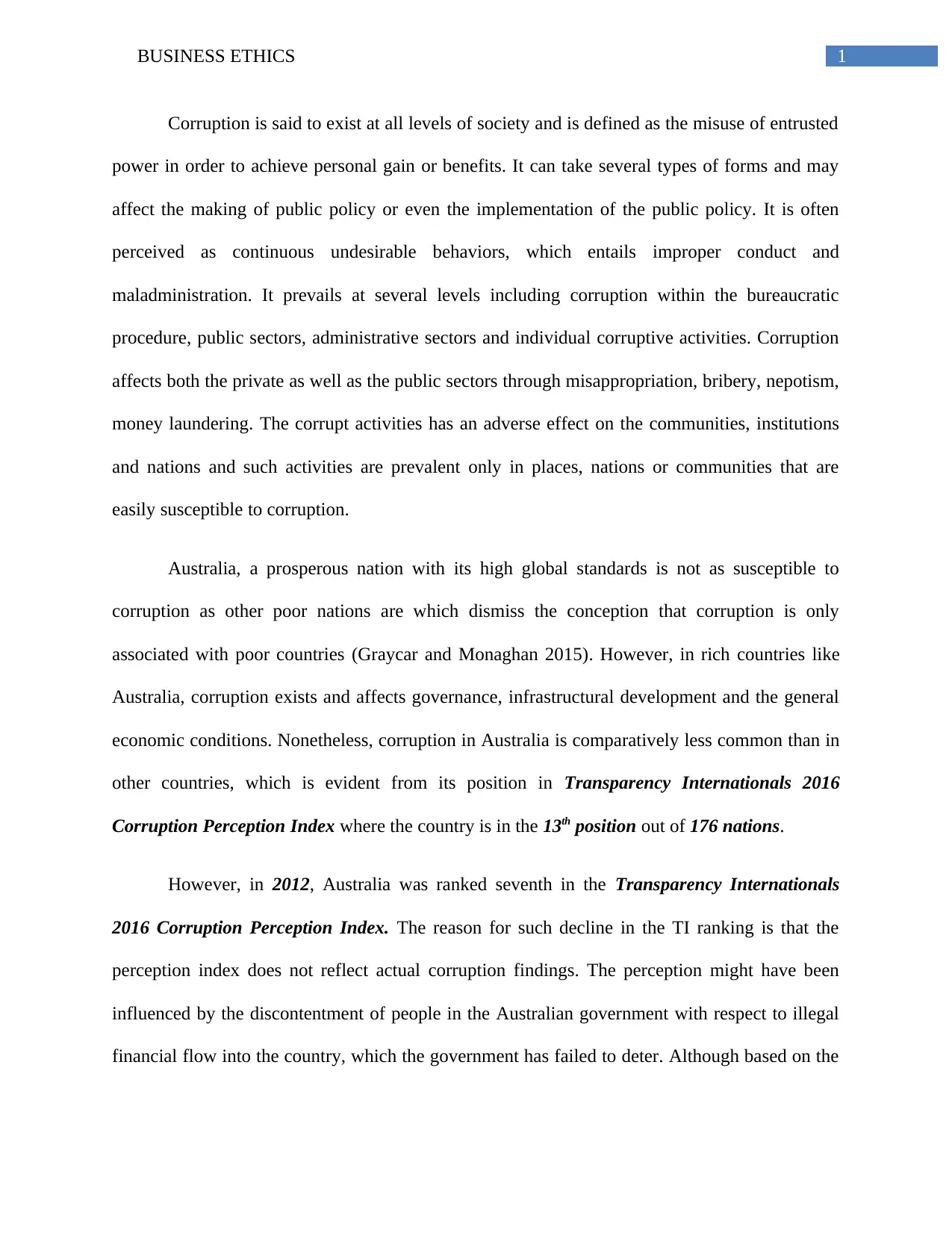
1BUSINESS ETHICS
Corruption is said to exist at all levels of society and is defined as the misuse of entrusted
power in order to achieve personal gain or benefits. It can take several types of forms and may
affect the making of public policy or even the implementation of the public policy. It is often
perceived as continuous undesirable behaviors, which entails improper conduct and
maladministration. It prevails at several levels including corruption within the bureaucratic
procedure, public sectors, administrative sectors and individual corruptive activities. Corruption
affects both the private as well as the public sectors through misappropriation, bribery, nepotism,
money laundering. The corrupt activities has an adverse effect on the communities, institutions
and nations and such activities are prevalent only in places, nations or communities that are
easily susceptible to corruption.
Australia, a prosperous nation with its high global standards is not as susceptible to
corruption as other poor nations are which dismiss the conception that corruption is only
associated with poor countries (Graycar and Monaghan 2015). However, in rich countries like
Australia, corruption exists and affects governance, infrastructural development and the general
economic conditions. Nonetheless, corruption in Australia is comparatively less common than in
other countries, which is evident from its position in Transparency Internationals 2016
Corruption Perception Index where the country is in the 13th position out of 176 nations.
However, in 2012, Australia was ranked seventh in the Transparency Internationals
2016 Corruption Perception Index. The reason for such decline in the TI ranking is that the
perception index does not reflect actual corruption findings. The perception might have been
influenced by the discontentment of people in the Australian government with respect to illegal
financial flow into the country, which the government has failed to deter. Although based on the
Corruption is said to exist at all levels of society and is defined as the misuse of entrusted
power in order to achieve personal gain or benefits. It can take several types of forms and may
affect the making of public policy or even the implementation of the public policy. It is often
perceived as continuous undesirable behaviors, which entails improper conduct and
maladministration. It prevails at several levels including corruption within the bureaucratic
procedure, public sectors, administrative sectors and individual corruptive activities. Corruption
affects both the private as well as the public sectors through misappropriation, bribery, nepotism,
money laundering. The corrupt activities has an adverse effect on the communities, institutions
and nations and such activities are prevalent only in places, nations or communities that are
easily susceptible to corruption.
Australia, a prosperous nation with its high global standards is not as susceptible to
corruption as other poor nations are which dismiss the conception that corruption is only
associated with poor countries (Graycar and Monaghan 2015). However, in rich countries like
Australia, corruption exists and affects governance, infrastructural development and the general
economic conditions. Nonetheless, corruption in Australia is comparatively less common than in
other countries, which is evident from its position in Transparency Internationals 2016
Corruption Perception Index where the country is in the 13th position out of 176 nations.
However, in 2012, Australia was ranked seventh in the Transparency Internationals
2016 Corruption Perception Index. The reason for such decline in the TI ranking is that the
perception index does not reflect actual corruption findings. The perception might have been
influenced by the discontentment of people in the Australian government with respect to illegal
financial flow into the country, which the government has failed to deter. Although based on the
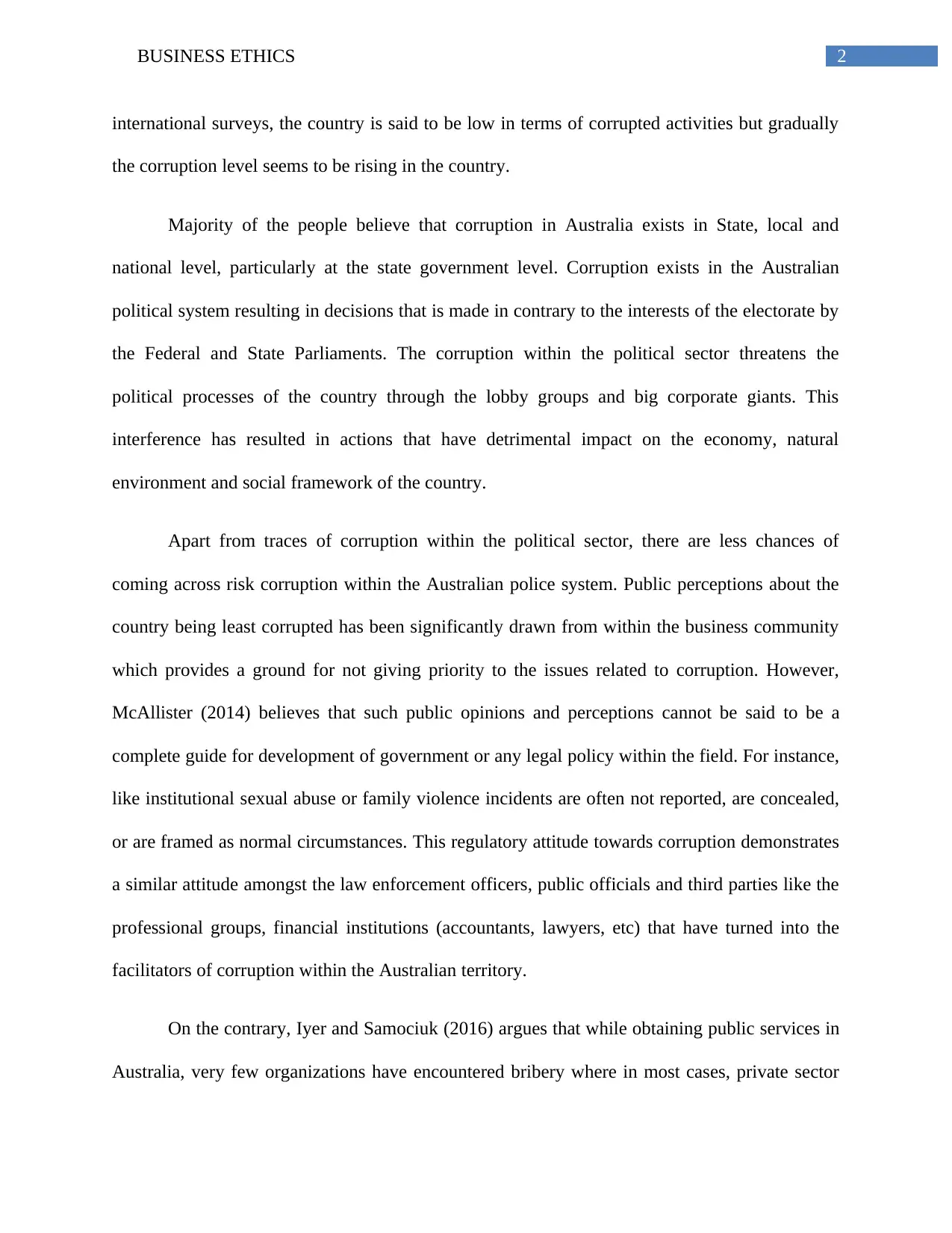
2BUSINESS ETHICS
international surveys, the country is said to be low in terms of corrupted activities but gradually
the corruption level seems to be rising in the country.
Majority of the people believe that corruption in Australia exists in State, local and
national level, particularly at the state government level. Corruption exists in the Australian
political system resulting in decisions that is made in contrary to the interests of the electorate by
the Federal and State Parliaments. The corruption within the political sector threatens the
political processes of the country through the lobby groups and big corporate giants. This
interference has resulted in actions that have detrimental impact on the economy, natural
environment and social framework of the country.
Apart from traces of corruption within the political sector, there are less chances of
coming across risk corruption within the Australian police system. Public perceptions about the
country being least corrupted has been significantly drawn from within the business community
which provides a ground for not giving priority to the issues related to corruption. However,
McAllister (2014) believes that such public opinions and perceptions cannot be said to be a
complete guide for development of government or any legal policy within the field. For instance,
like institutional sexual abuse or family violence incidents are often not reported, are concealed,
or are framed as normal circumstances. This regulatory attitude towards corruption demonstrates
a similar attitude amongst the law enforcement officers, public officials and third parties like the
professional groups, financial institutions (accountants, lawyers, etc) that have turned into the
facilitators of corruption within the Australian territory.
On the contrary, Iyer and Samociuk (2016) argues that while obtaining public services in
Australia, very few organizations have encountered bribery where in most cases, private sector
international surveys, the country is said to be low in terms of corrupted activities but gradually
the corruption level seems to be rising in the country.
Majority of the people believe that corruption in Australia exists in State, local and
national level, particularly at the state government level. Corruption exists in the Australian
political system resulting in decisions that is made in contrary to the interests of the electorate by
the Federal and State Parliaments. The corruption within the political sector threatens the
political processes of the country through the lobby groups and big corporate giants. This
interference has resulted in actions that have detrimental impact on the economy, natural
environment and social framework of the country.
Apart from traces of corruption within the political sector, there are less chances of
coming across risk corruption within the Australian police system. Public perceptions about the
country being least corrupted has been significantly drawn from within the business community
which provides a ground for not giving priority to the issues related to corruption. However,
McAllister (2014) believes that such public opinions and perceptions cannot be said to be a
complete guide for development of government or any legal policy within the field. For instance,
like institutional sexual abuse or family violence incidents are often not reported, are concealed,
or are framed as normal circumstances. This regulatory attitude towards corruption demonstrates
a similar attitude amongst the law enforcement officers, public officials and third parties like the
professional groups, financial institutions (accountants, lawyers, etc) that have turned into the
facilitators of corruption within the Australian territory.
On the contrary, Iyer and Samociuk (2016) argues that while obtaining public services in
Australia, very few organizations have encountered bribery where in most cases, private sector
⊘ This is a preview!⊘
Do you want full access?
Subscribe today to unlock all pages.

Trusted by 1+ million students worldwide
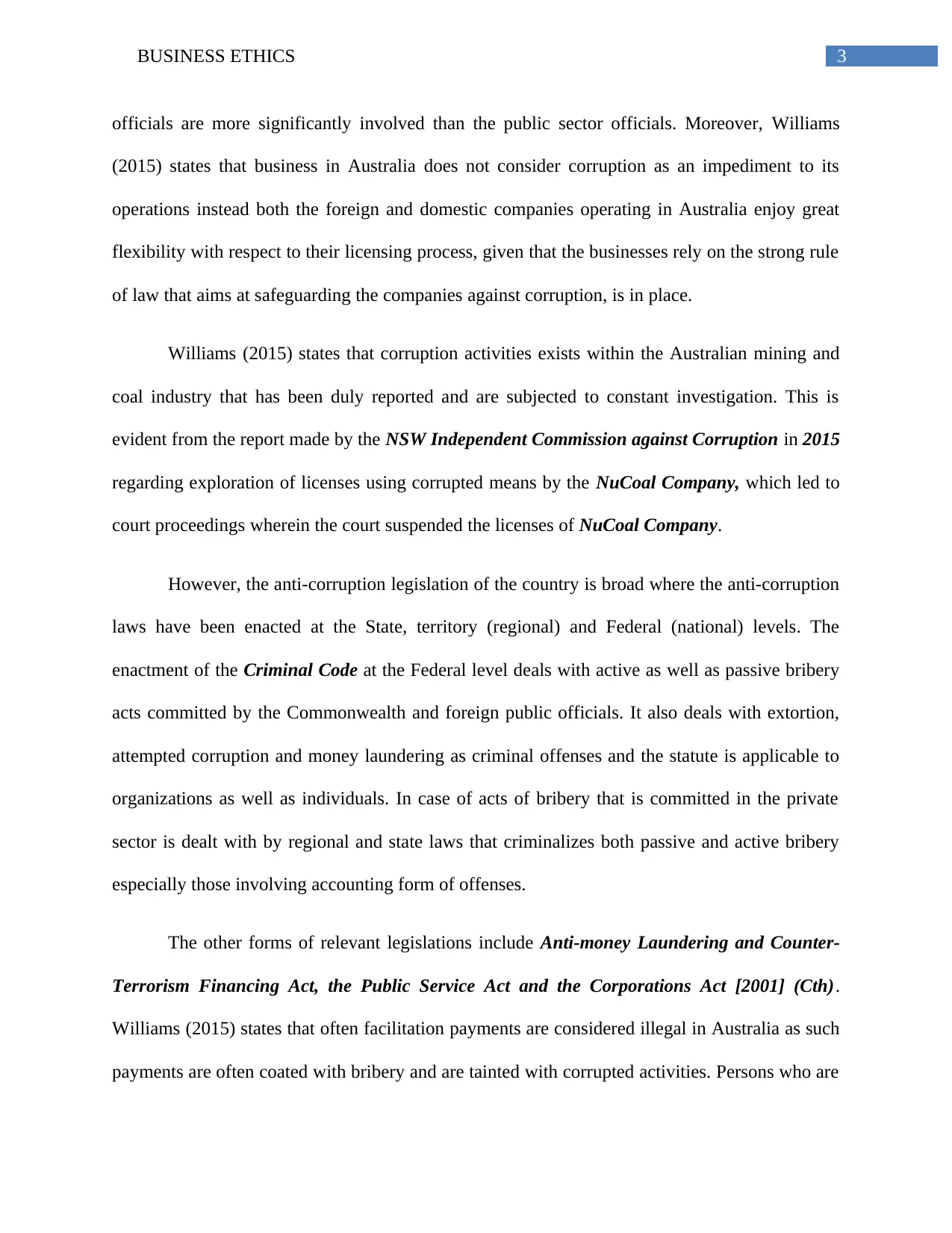
3BUSINESS ETHICS
officials are more significantly involved than the public sector officials. Moreover, Williams
(2015) states that business in Australia does not consider corruption as an impediment to its
operations instead both the foreign and domestic companies operating in Australia enjoy great
flexibility with respect to their licensing process, given that the businesses rely on the strong rule
of law that aims at safeguarding the companies against corruption, is in place.
Williams (2015) states that corruption activities exists within the Australian mining and
coal industry that has been duly reported and are subjected to constant investigation. This is
evident from the report made by the NSW Independent Commission against Corruption in 2015
regarding exploration of licenses using corrupted means by the NuCoal Company, which led to
court proceedings wherein the court suspended the licenses of NuCoal Company.
However, the anti-corruption legislation of the country is broad where the anti-corruption
laws have been enacted at the State, territory (regional) and Federal (national) levels. The
enactment of the Criminal Code at the Federal level deals with active as well as passive bribery
acts committed by the Commonwealth and foreign public officials. It also deals with extortion,
attempted corruption and money laundering as criminal offenses and the statute is applicable to
organizations as well as individuals. In case of acts of bribery that is committed in the private
sector is dealt with by regional and state laws that criminalizes both passive and active bribery
especially those involving accounting form of offenses.
The other forms of relevant legislations include Anti-money Laundering and Counter-
Terrorism Financing Act, the Public Service Act and the Corporations Act [2001] (Cth).
Williams (2015) states that often facilitation payments are considered illegal in Australia as such
payments are often coated with bribery and are tainted with corrupted activities. Persons who are
officials are more significantly involved than the public sector officials. Moreover, Williams
(2015) states that business in Australia does not consider corruption as an impediment to its
operations instead both the foreign and domestic companies operating in Australia enjoy great
flexibility with respect to their licensing process, given that the businesses rely on the strong rule
of law that aims at safeguarding the companies against corruption, is in place.
Williams (2015) states that corruption activities exists within the Australian mining and
coal industry that has been duly reported and are subjected to constant investigation. This is
evident from the report made by the NSW Independent Commission against Corruption in 2015
regarding exploration of licenses using corrupted means by the NuCoal Company, which led to
court proceedings wherein the court suspended the licenses of NuCoal Company.
However, the anti-corruption legislation of the country is broad where the anti-corruption
laws have been enacted at the State, territory (regional) and Federal (national) levels. The
enactment of the Criminal Code at the Federal level deals with active as well as passive bribery
acts committed by the Commonwealth and foreign public officials. It also deals with extortion,
attempted corruption and money laundering as criminal offenses and the statute is applicable to
organizations as well as individuals. In case of acts of bribery that is committed in the private
sector is dealt with by regional and state laws that criminalizes both passive and active bribery
especially those involving accounting form of offenses.
The other forms of relevant legislations include Anti-money Laundering and Counter-
Terrorism Financing Act, the Public Service Act and the Corporations Act [2001] (Cth).
Williams (2015) states that often facilitation payments are considered illegal in Australia as such
payments are often coated with bribery and are tainted with corrupted activities. Persons who are
Paraphrase This Document
Need a fresh take? Get an instant paraphrase of this document with our AI Paraphraser
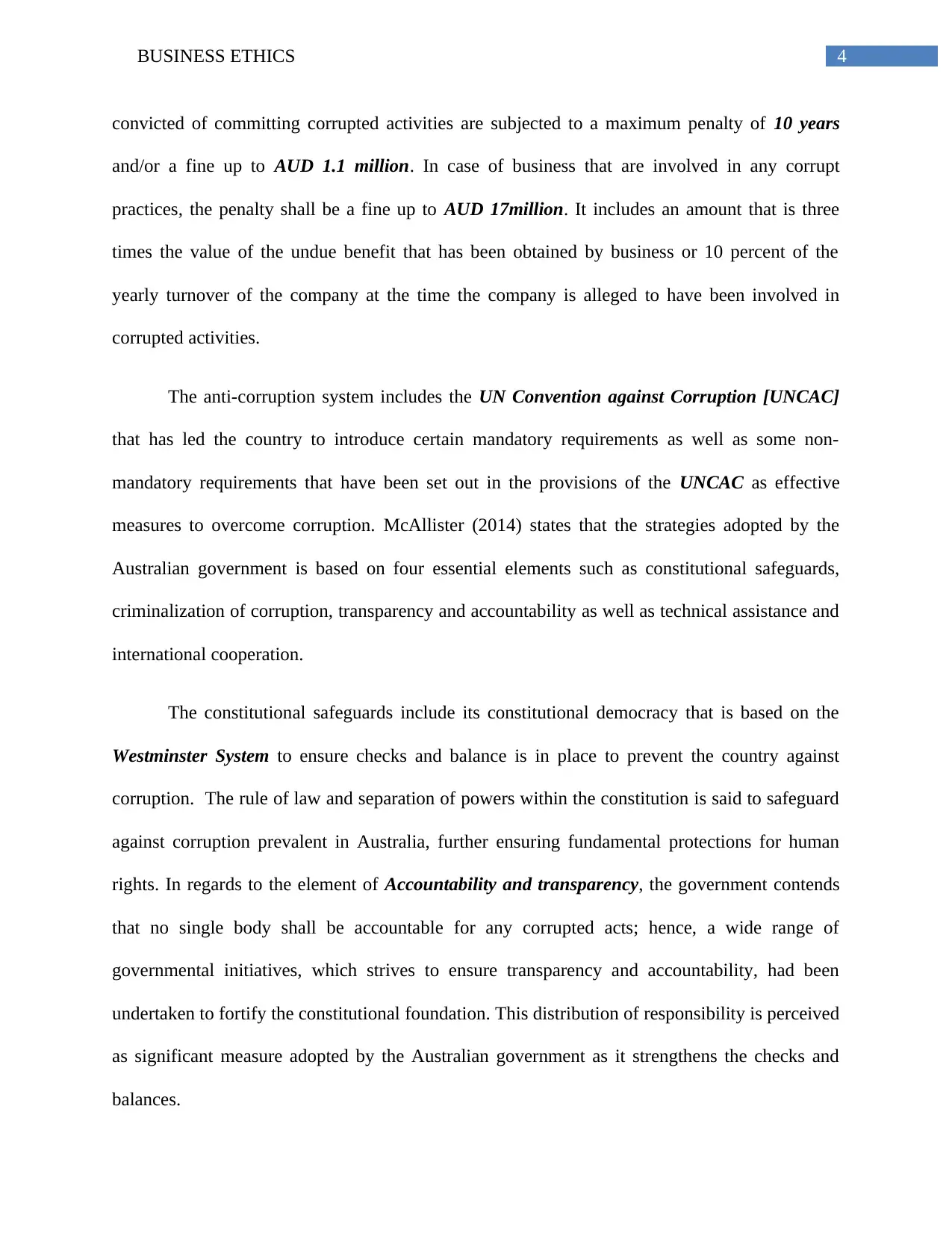
4BUSINESS ETHICS
convicted of committing corrupted activities are subjected to a maximum penalty of 10 years
and/or a fine up to AUD 1.1 million. In case of business that are involved in any corrupt
practices, the penalty shall be a fine up to AUD 17million. It includes an amount that is three
times the value of the undue benefit that has been obtained by business or 10 percent of the
yearly turnover of the company at the time the company is alleged to have been involved in
corrupted activities.
The anti-corruption system includes the UN Convention against Corruption [UNCAC]
that has led the country to introduce certain mandatory requirements as well as some non-
mandatory requirements that have been set out in the provisions of the UNCAC as effective
measures to overcome corruption. McAllister (2014) states that the strategies adopted by the
Australian government is based on four essential elements such as constitutional safeguards,
criminalization of corruption, transparency and accountability as well as technical assistance and
international cooperation.
The constitutional safeguards include its constitutional democracy that is based on the
Westminster System to ensure checks and balance is in place to prevent the country against
corruption. The rule of law and separation of powers within the constitution is said to safeguard
against corruption prevalent in Australia, further ensuring fundamental protections for human
rights. In regards to the element of Accountability and transparency, the government contends
that no single body shall be accountable for any corrupted acts; hence, a wide range of
governmental initiatives, which strives to ensure transparency and accountability, had been
undertaken to fortify the constitutional foundation. This distribution of responsibility is perceived
as significant measure adopted by the Australian government as it strengthens the checks and
balances.
convicted of committing corrupted activities are subjected to a maximum penalty of 10 years
and/or a fine up to AUD 1.1 million. In case of business that are involved in any corrupt
practices, the penalty shall be a fine up to AUD 17million. It includes an amount that is three
times the value of the undue benefit that has been obtained by business or 10 percent of the
yearly turnover of the company at the time the company is alleged to have been involved in
corrupted activities.
The anti-corruption system includes the UN Convention against Corruption [UNCAC]
that has led the country to introduce certain mandatory requirements as well as some non-
mandatory requirements that have been set out in the provisions of the UNCAC as effective
measures to overcome corruption. McAllister (2014) states that the strategies adopted by the
Australian government is based on four essential elements such as constitutional safeguards,
criminalization of corruption, transparency and accountability as well as technical assistance and
international cooperation.
The constitutional safeguards include its constitutional democracy that is based on the
Westminster System to ensure checks and balance is in place to prevent the country against
corruption. The rule of law and separation of powers within the constitution is said to safeguard
against corruption prevalent in Australia, further ensuring fundamental protections for human
rights. In regards to the element of Accountability and transparency, the government contends
that no single body shall be accountable for any corrupted acts; hence, a wide range of
governmental initiatives, which strives to ensure transparency and accountability, had been
undertaken to fortify the constitutional foundation. This distribution of responsibility is perceived
as significant measure adopted by the Australian government as it strengthens the checks and
balances.
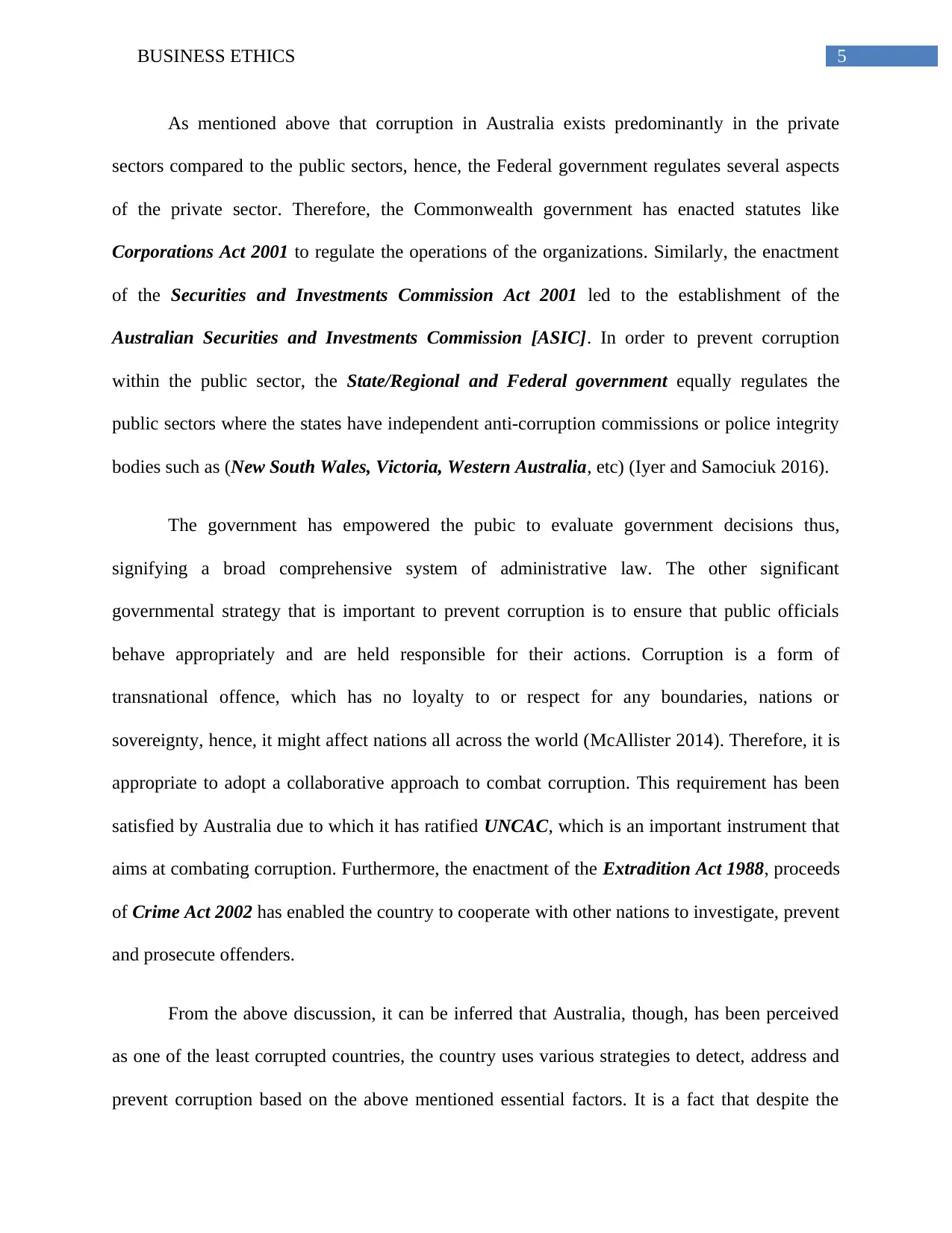
5BUSINESS ETHICS
As mentioned above that corruption in Australia exists predominantly in the private
sectors compared to the public sectors, hence, the Federal government regulates several aspects
of the private sector. Therefore, the Commonwealth government has enacted statutes like
Corporations Act 2001 to regulate the operations of the organizations. Similarly, the enactment
of the Securities and Investments Commission Act 2001 led to the establishment of the
Australian Securities and Investments Commission [ASIC]. In order to prevent corruption
within the public sector, the State/Regional and Federal government equally regulates the
public sectors where the states have independent anti-corruption commissions or police integrity
bodies such as (New South Wales, Victoria, Western Australia, etc) (Iyer and Samociuk 2016).
The government has empowered the pubic to evaluate government decisions thus,
signifying a broad comprehensive system of administrative law. The other significant
governmental strategy that is important to prevent corruption is to ensure that public officials
behave appropriately and are held responsible for their actions. Corruption is a form of
transnational offence, which has no loyalty to or respect for any boundaries, nations or
sovereignty, hence, it might affect nations all across the world (McAllister 2014). Therefore, it is
appropriate to adopt a collaborative approach to combat corruption. This requirement has been
satisfied by Australia due to which it has ratified UNCAC, which is an important instrument that
aims at combating corruption. Furthermore, the enactment of the Extradition Act 1988, proceeds
of Crime Act 2002 has enabled the country to cooperate with other nations to investigate, prevent
and prosecute offenders.
From the above discussion, it can be inferred that Australia, though, has been perceived
as one of the least corrupted countries, the country uses various strategies to detect, address and
prevent corruption based on the above mentioned essential factors. It is a fact that despite the
As mentioned above that corruption in Australia exists predominantly in the private
sectors compared to the public sectors, hence, the Federal government regulates several aspects
of the private sector. Therefore, the Commonwealth government has enacted statutes like
Corporations Act 2001 to regulate the operations of the organizations. Similarly, the enactment
of the Securities and Investments Commission Act 2001 led to the establishment of the
Australian Securities and Investments Commission [ASIC]. In order to prevent corruption
within the public sector, the State/Regional and Federal government equally regulates the
public sectors where the states have independent anti-corruption commissions or police integrity
bodies such as (New South Wales, Victoria, Western Australia, etc) (Iyer and Samociuk 2016).
The government has empowered the pubic to evaluate government decisions thus,
signifying a broad comprehensive system of administrative law. The other significant
governmental strategy that is important to prevent corruption is to ensure that public officials
behave appropriately and are held responsible for their actions. Corruption is a form of
transnational offence, which has no loyalty to or respect for any boundaries, nations or
sovereignty, hence, it might affect nations all across the world (McAllister 2014). Therefore, it is
appropriate to adopt a collaborative approach to combat corruption. This requirement has been
satisfied by Australia due to which it has ratified UNCAC, which is an important instrument that
aims at combating corruption. Furthermore, the enactment of the Extradition Act 1988, proceeds
of Crime Act 2002 has enabled the country to cooperate with other nations to investigate, prevent
and prosecute offenders.
From the above discussion, it can be inferred that Australia, though, has been perceived
as one of the least corrupted countries, the country uses various strategies to detect, address and
prevent corruption based on the above mentioned essential factors. It is a fact that despite the
⊘ This is a preview!⊘
Do you want full access?
Subscribe today to unlock all pages.

Trusted by 1+ million students worldwide
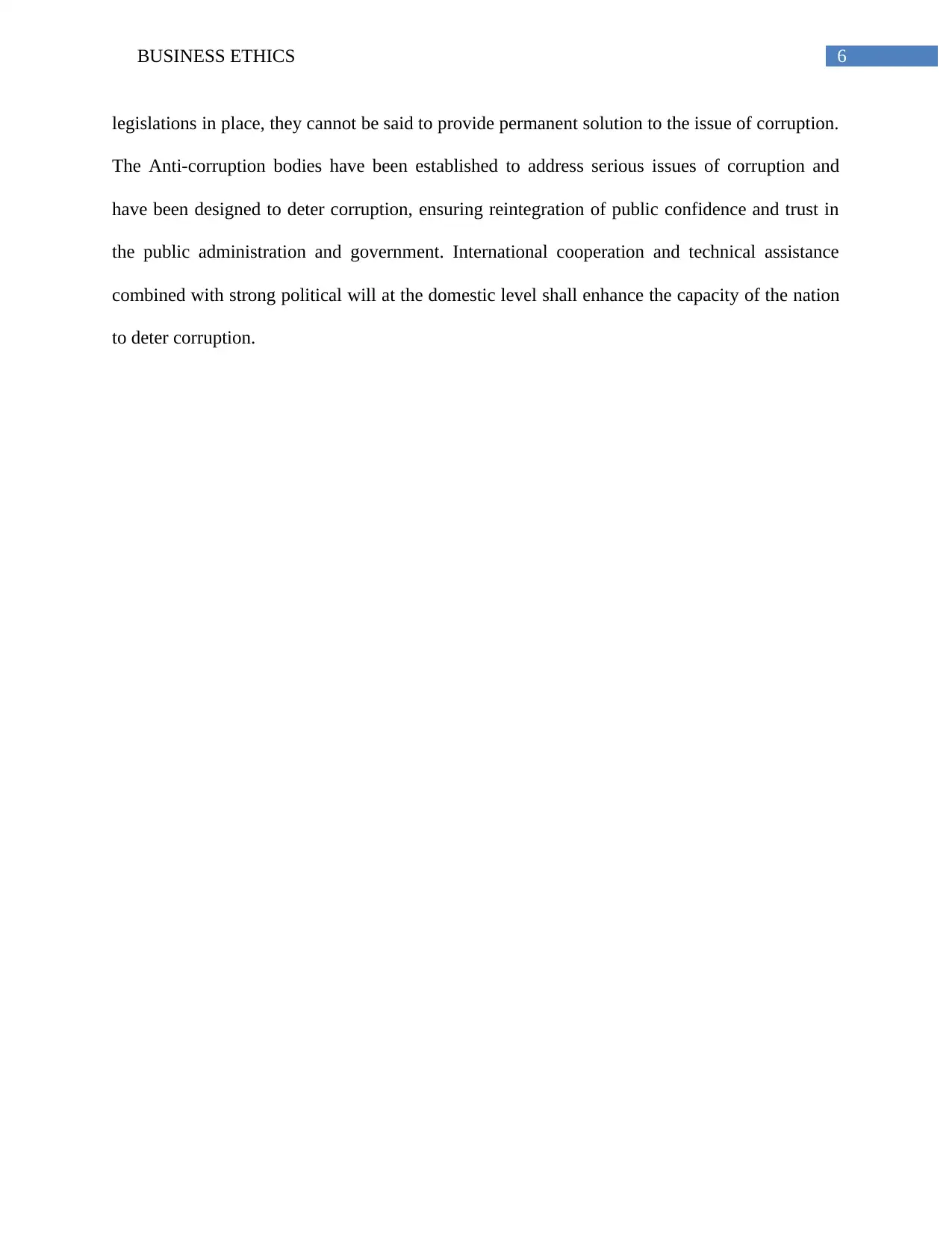
6BUSINESS ETHICS
legislations in place, they cannot be said to provide permanent solution to the issue of corruption.
The Anti-corruption bodies have been established to address serious issues of corruption and
have been designed to deter corruption, ensuring reintegration of public confidence and trust in
the public administration and government. International cooperation and technical assistance
combined with strong political will at the domestic level shall enhance the capacity of the nation
to deter corruption.
legislations in place, they cannot be said to provide permanent solution to the issue of corruption.
The Anti-corruption bodies have been established to address serious issues of corruption and
have been designed to deter corruption, ensuring reintegration of public confidence and trust in
the public administration and government. International cooperation and technical assistance
combined with strong political will at the domestic level shall enhance the capacity of the nation
to deter corruption.
Paraphrase This Document
Need a fresh take? Get an instant paraphrase of this document with our AI Paraphraser
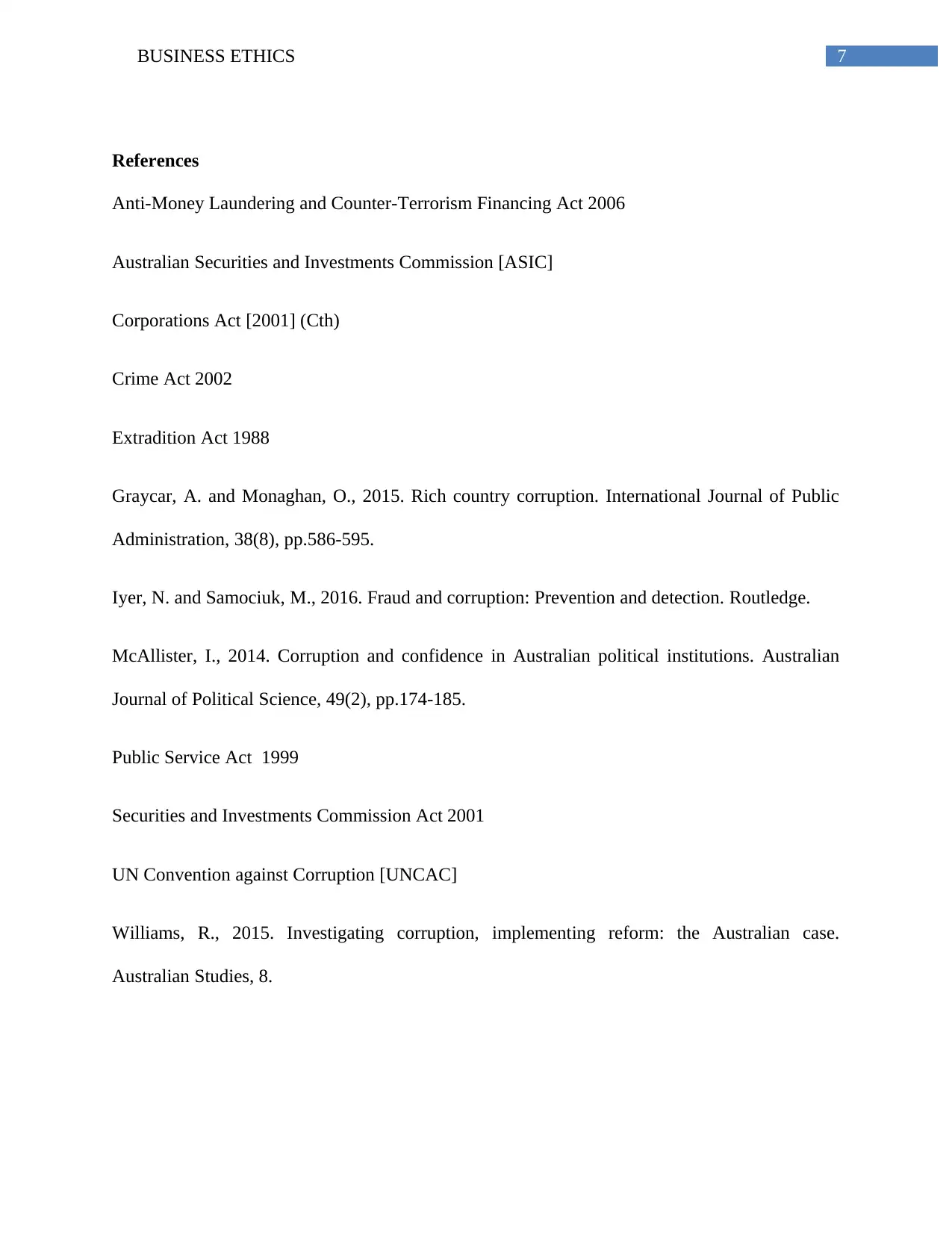
7BUSINESS ETHICS
References
Anti-Money Laundering and Counter-Terrorism Financing Act 2006
Australian Securities and Investments Commission [ASIC]
Corporations Act [2001] (Cth)
Crime Act 2002
Extradition Act 1988
Graycar, A. and Monaghan, O., 2015. Rich country corruption. International Journal of Public
Administration, 38(8), pp.586-595.
Iyer, N. and Samociuk, M., 2016. Fraud and corruption: Prevention and detection. Routledge.
McAllister, I., 2014. Corruption and confidence in Australian political institutions. Australian
Journal of Political Science, 49(2), pp.174-185.
Public Service Act 1999
Securities and Investments Commission Act 2001
UN Convention against Corruption [UNCAC]
Williams, R., 2015. Investigating corruption, implementing reform: the Australian case.
Australian Studies, 8.
References
Anti-Money Laundering and Counter-Terrorism Financing Act 2006
Australian Securities and Investments Commission [ASIC]
Corporations Act [2001] (Cth)
Crime Act 2002
Extradition Act 1988
Graycar, A. and Monaghan, O., 2015. Rich country corruption. International Journal of Public
Administration, 38(8), pp.586-595.
Iyer, N. and Samociuk, M., 2016. Fraud and corruption: Prevention and detection. Routledge.
McAllister, I., 2014. Corruption and confidence in Australian political institutions. Australian
Journal of Political Science, 49(2), pp.174-185.
Public Service Act 1999
Securities and Investments Commission Act 2001
UN Convention against Corruption [UNCAC]
Williams, R., 2015. Investigating corruption, implementing reform: the Australian case.
Australian Studies, 8.
1 out of 8
Related Documents
Your All-in-One AI-Powered Toolkit for Academic Success.
+13062052269
info@desklib.com
Available 24*7 on WhatsApp / Email
![[object Object]](/_next/static/media/star-bottom.7253800d.svg)
Unlock your academic potential
Copyright © 2020–2026 A2Z Services. All Rights Reserved. Developed and managed by ZUCOL.





